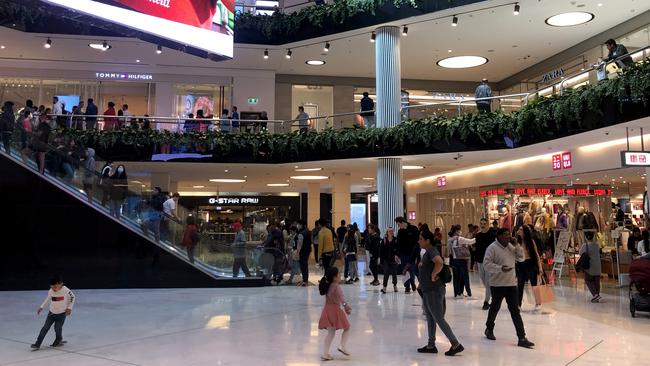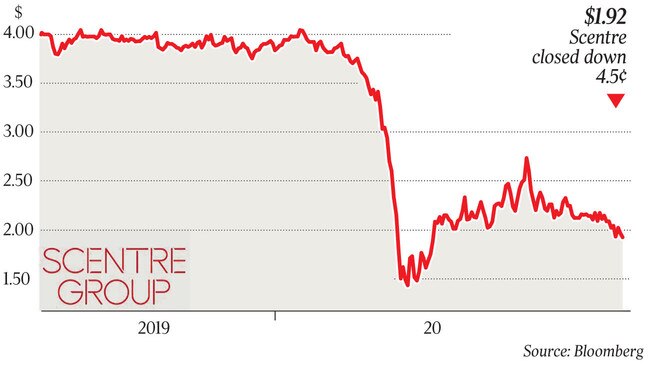Westfield mall values slashed by 10pc
Mall operator Scentre reveals the impact of shutdowns on its portfolio, as it reverses pandemic pay cuts for board and bosses.

Shopping centre landlords have been shaken by sector giant Scentre Group disclosing a 10 per cent drop in the value of its portfolio even before woes related to Victoria’s latest coronavirus crisis are taken into account.
The strict imposition of stage four lockdown rules in metropolitan Melbourne prompted a further sell-off in retail landlords on Thursday as the depth of the state’s economic crisis threatens to plunge more chains into administration.
While Scentre, which controls Australia’s Westfield empire, says the value of its portfolio took a 10 per cent hit from the coronavirus pandemic in the first half of the year as stores closed and tenants sought rent relief, stocks exposed to Melbourne were hardest hit.
Vicinity Centres, co-owner of Chadstone, fell 3 per cent to $1.27 and Scentre was off by 2.3 per cent to $1.92 as investors bet on an extended slowdown.
While Scentre has top quality malls in Australia and New Zealand, and the fall in the carrying value of its property portfolio was substantial, analysts said further falls were likely.
Scentre’s portfolio is Sydney-centric and foot traffic and sales are likely to hold up better than rival Vicinity but the analysts are wary about its gearing rising if there is a 30 per cent peak-to-trough fall in asset values.

“The disclosed portfolio devaluation is in line with our expectations for asset values to decline by 25-30 per cent over the next 12-18 months,” JPMorgan analysts led by Richard Jones said. They warned that the sector would face issues while the pandemic was not under control.
“Retail has faced a difficult second quarter impacted by COVID-19 social distancing measures and continues to face an uncertain backdrop given stage four lockdowns in Melbourne and potential for second waves of infections in other states,” Mr Jones said.
Scentre said its net operating cashflow was expected to be in excess of $250m in the six months to June but did not provide further details. It did note that it had not received any funds from the federal government’s JobKeeper scheme.
Mr Jones said the operating cash flow compared to $629m in the first half of 2019 and was positive despite the COVID-19 backdrop.
But he said the cash flow was hard to interpret. Investors are keen to know the percentage rent was paid on average by tenants and the percentage of tenants who have paid rent.
In one of the first moves of its kind, Scentre also revealed that pay cuts for its board and the Peter Allen-led executive team, first imposed in May to ease the burden of the pandemic, would be scrapped from August 1, with all fees and fixed remuneration reverting to previous levels.
Mr Allen received compensation of $7.49m last year. He received $9.17m in 2018 and $8.9m in 2017.
By chopping values back Scentre effectively joined rival companies in resetting its property holdings as customers desert malls and tenants baulk at paying rent for the first pandemic-related shutdowns. Vicinity had cut its values by about 11 per cent.
Mall owners are expected to cop further hits to values in this half as larger centres, many of which are anchored by department stores, face demands from tenants looking to dramatically cut back their spaces or pay much lower rent.
More fragile small tenants, although protected under the Morrison government’s leasing code, are also under financial strain and there are fears some will struggle to reopen, particularly in Melbourne, where stage four restrictions have prompted widespread closures.
Scentre has a limited exposure to Melbourne compared to rivals Vicinity and GPT, which owns Highpoint. But Scentre’s large malls in Sydney are bolstered by international tourism which has now stalled, while demand for leisure activities is constrained by social distancing rules.
Further value falls are also being driven by a lack of demand among pension fund investors for regional malls, with large offshore and local players signalling their desire to cut back exposure to the sector.
Australian shopping centre values are also yet to fall as far as in Britain or the United States, where the penetration of e-commerce is deeper.
Mall owners are also facing off against tenants who want leases restructured to reflect their lower turnovers, with substantial pushback against fixed increases as retailers struggle to stay afloat.
Macquarie Equities analysts Darren Leung and Stuart McLean said that structural trends continue to unfold in discretionary retail “which we believe will impact property valuations, consequently placing pressure on balance sheet metrics”.
They said Scentre‘s cash flow figure implied rent collection of about 39 per cent for the June 2020 quarter.






To join the conversation, please log in. Don't have an account? Register
Join the conversation, you are commenting as Logout